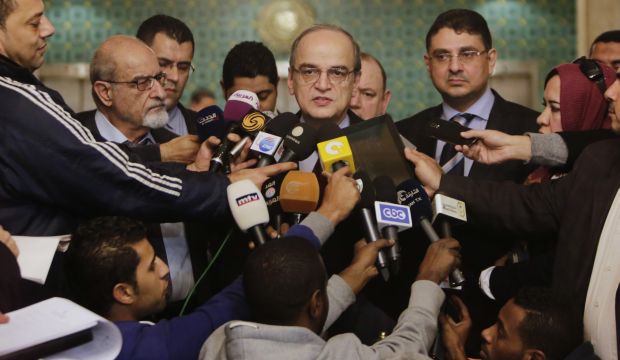
Hadi Al-Bahra, the former head of the Syrian National Coalition, speaks during a press conference following his meeting with Arab League Secretary-General Nabil Elaraby at the league's headquarters in Cairo, Egypt, on December 27, 2014. (AP Photo/Amr Nabil)
Beirut and London, Asharq Al-Awsat—The main Syrian umbrella opposition group, the Syrian National Coalition, has elected a new president.
Khaled Khoja, a 49-year-old doctor and businessman, and one of the founding members of the Coalition, won 56 out of 106 votes cast by members of the Coalition in a vote on Sunday. He will take over from Hadi Al-Bahra, who was elected last July and declined to run for a second term.
A member of the Coalition, speaking to Asharq Al-Awsat on condition of anonymity, said Khoja and Coalition Secretary-General Nasr Al-Hariri—the second candidate for the post—were both “consensus candidates,” in reference to some of the disagreements that have dogged the Coalition in recent months.
Among these remains the issue of attending talks with the Syrian government in Russia later this month.
Members of the Coalition have been meeting in Cairo in recent weeks to decide on an official position toward the conference. The Coalition remains split on whether to attend, though some senior members have said they are ready to do so should they receive an official invitation to the talks in Moscow.
The Syrian opposition—represented by the Coalition and the country’s other main umbrella group, the Syria-based National Coordination Committee—insists that any meetings with the government must be based on the outcomes of the communique issued at the conclusion of the “Geneva I” conference in the Swiss city in June 2012.
Among other measures, the communique calls for the formation of a transitional government in Syria that could include both government and opposition figures, something Damascus wholly rejects.
Meanwhile, speaking to Asharq Al-Awsat, another source within the Coalition—who also spoke on condition of anonymity—said the group would now be holding further votes to elect a number of other important posts. These include the posts for the group’s new secretary-general and Mr. Khoja’s deputy, as well as the deputy prime minister and justice and culture ministers in the opposition interim government of Prime Minister Ahmad Tu’mah.
